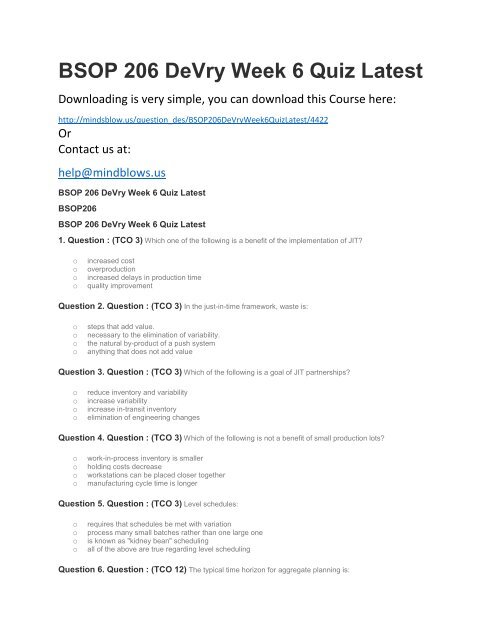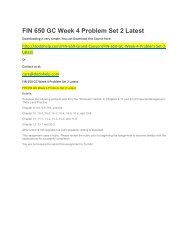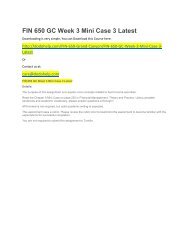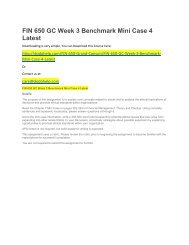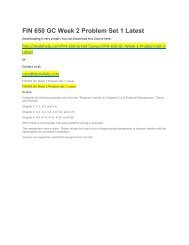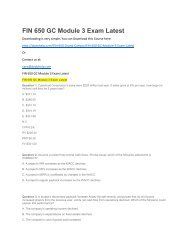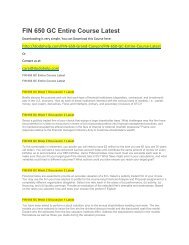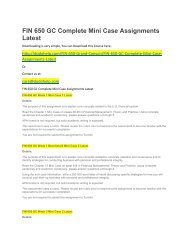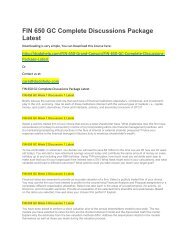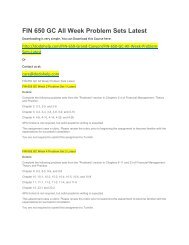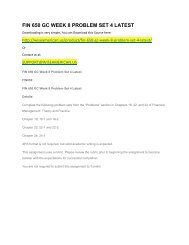BSOP 206 DeVry Week 6 Quiz Latest
You also want an ePaper? Increase the reach of your titles
YUMPU automatically turns print PDFs into web optimized ePapers that Google loves.
<strong>BSOP</strong> <strong>206</strong> <strong>DeVry</strong> <strong>Week</strong> 6 <strong>Quiz</strong> <strong>Latest</strong><br />
Downloading is very simple, you can download this Course here:<br />
http://mindsblow.us/question_des/<strong>BSOP</strong><strong>206</strong><strong>DeVry</strong><strong>Week</strong>6<strong>Quiz</strong><strong>Latest</strong>/4422<br />
Or<br />
Contact us at:<br />
help@mindblows.us<br />
<strong>BSOP</strong> <strong>206</strong> <strong>DeVry</strong> <strong>Week</strong> 6 <strong>Quiz</strong> <strong>Latest</strong><br />
<strong>BSOP</strong><strong>206</strong><br />
<strong>BSOP</strong> <strong>206</strong> <strong>DeVry</strong> <strong>Week</strong> 6 <strong>Quiz</strong> <strong>Latest</strong><br />
1. Question : (TCO 3) Which one of the following is a benefit of the implementation of JIT?<br />
o<br />
o<br />
o<br />
o<br />
increased cost<br />
overproduction<br />
increased delays in production time<br />
quality improvement<br />
Question 2. Question : (TCO 3) In the just-in-time framework, waste is:<br />
o<br />
o<br />
o<br />
o<br />
steps that add value.<br />
necessary to the elimination of variability.<br />
the natural by-product of a push system<br />
anything that does not add value<br />
Question 3. Question : (TCO 3) Which of the following is a goal of JIT partnerships?<br />
o<br />
o<br />
o<br />
o<br />
reduce inventory and variability<br />
increase variability<br />
increase in-transit inventory<br />
elimination of engineering changes<br />
Question 4. Question : (TCO 3) Which of the following is not a benefit of small production lots?<br />
o<br />
o<br />
o<br />
o<br />
work-in-process inventory is smaller<br />
holding costs decrease<br />
workstations can be placed closer together<br />
manufacturing cycle time is longer<br />
Question 5. Question : (TCO 3) Level schedules:<br />
o<br />
o<br />
o<br />
o<br />
requires that schedules be met with variation<br />
process many small batches rather than one large one<br />
is known as "kidney bean" scheduling<br />
all of the above are true regarding level scheduling<br />
Question 6. Question : (TCO 12) The typical time horizon for aggregate planning is:
o<br />
o<br />
o<br />
o<br />
o<br />
less than a month<br />
up to three months<br />
three to 18 months<br />
over one year<br />
over five years<br />
Question 7. Question : (TCO 12) The planning tasks not associated with staffing, production, inventory, and<br />
sub-contracting levels typically fall under:<br />
o<br />
o<br />
o<br />
o<br />
short-range plans<br />
strategic planning<br />
long-range plans<br />
demand options none of the above<br />
Question 8. Question : (TCO 12) Aggregate planning is prepared:<br />
o<br />
o<br />
o<br />
o<br />
o<br />
directly from the short-term scheduling<br />
directly from the capacity plans<br />
from work center loading up<br />
from master schedules<br />
from the dispatch plans<br />
Question 9. Question : (TCO 12) Which of the following aggregate planning strategies is not a "capacity option"?<br />
o<br />
o<br />
o<br />
o<br />
o<br />
influencing demand by changing price<br />
absorb change in demand during the planning period<br />
modify the workforce to absorb fluctuations<br />
changes due to varying size of the workforce<br />
all of the above are capacity options<br />
Question 10. Question : (TCO 12) Which of the following is the term used for medium range capacity planning<br />
with a time horizon of three to 18 months?<br />
o<br />
o<br />
o<br />
o<br />
material requirements planning<br />
short-range planning<br />
strategic planning<br />
aggregate planning<br />
Question 1. Question : (TCO 3) Match the following terms with their correct definition. Comments:<br />
Question 2. Question : (TCO 3) Define the linkage of continuous improvement and TPS.<br />
Question 3. Question : (TCO 3) Identify three ways in which JIT contributes to a competitive advantage?<br />
Question 4. Question : (TCO 3) What are three ways in which JIT and the Cost of Quality are related?<br />
Question 5. Question : (TCO 12) What is level-scheduling and what does it do?<br />
Question 6. Question : (TCO 12) What makes short-term scheduling of strategic importance?<br />
Question 7. Question : (TCO 12) What is aggregate planning, and what is its key objective?


